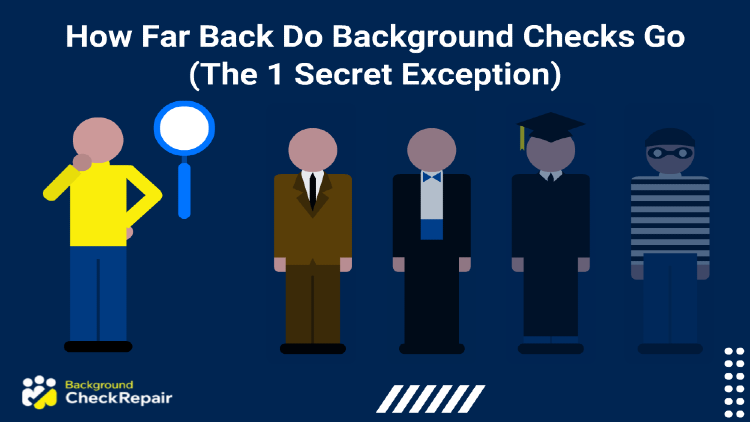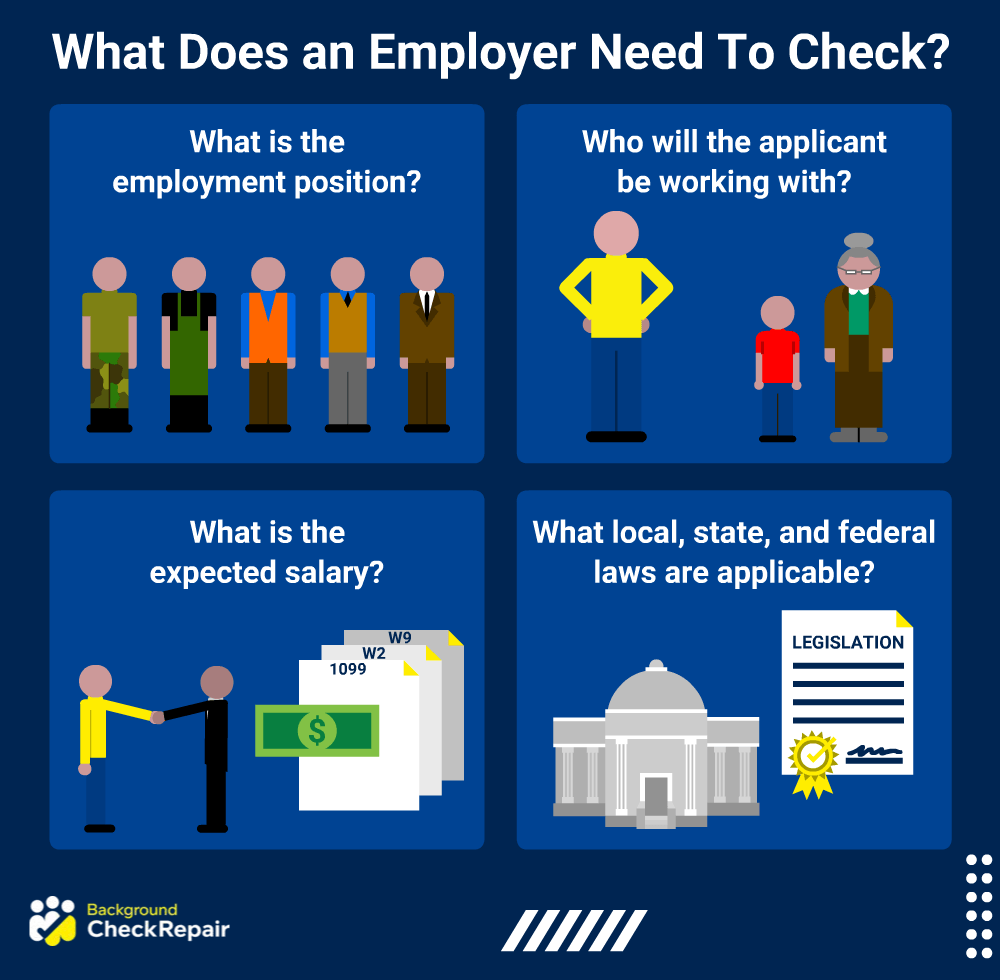We use cookies to ensure that we give you the best experience on our website. If you continue to use this site we will assume that you are happy with it
How Far Back Do Background Checks Go (The 1 Secret Exception)
 Written by Kristy Griffin
Written by Kristy Griffin
Background Checks | May 10, 2024

Table of Contents
Many people who are applying for a new position wonder how far back do background checks go? And while the length often depends on a number of factors, there is one secret exception that you may not know… but you should.
One of the most common reasons for a background check is pre-employment screening, but they’re also used for tenancy applications, adoptions, and other reasons, both professional and personal. Whether you are the subject of a background check or you’re the person seeking a background check on another person, you will want to know, how far back do background checks go?
Generally, most background checks cover seven years of a person’s criminal history. However, there is one secret exception to this general rule. Where you live makes a big difference. There are several federal laws and some state laws that restrict how a background check can be used and when, as well as how far back in your history it can explore. It may also depend upon the reason for the background check.
Knowing the when’s, where’s, and why’s behind the seven-year exemption rule can make it easier for both employers and applicants to get through the background check process. But first, what is this (largely) unknown exception, and why does it impact the answer to how far do background checks go?
How Far Back Do Background Checks Go? Understanding the “Secret” Exception
Background checks are designed as a tool for employers to confirm the qualifications of a job candidate. Certain types of information on a background check can go back indefinitely. For instance, a potential employer can access information regarding your employment history, educational history, and proof of any professional licenses you may have held for an indefinite period of time, as well as juvenile records, in some cases.
Obviously, this makes sense because an employer needs to verify a candidate’s prior employment experience to determine their qualifications and fit for the position. Likewise, an employer needs to access a candidate’s educational background regardless of how long ago he or she attended a school, university, or institution. It is also necessary for an employer to confirm that a candidate actually holds the professional license necessary for a job, regardless of when he or she obtained that license.

Other than educational history, employment history, and verification of professional licenses, pre-employment background checks generally cover seven years of a candidate’s court and criminal records. However, there is an exception to this general rule.
It all depends on where you live.
Depending on where you live, a background check could go back indefinitely or it could be limited to a specific time frame. Certain states have their own rules that make a big difference in how far back a background check goes.
Regulations and Rules For How Far Back Background Checks Can Go
There are several regulations that impact the time a history check can examine. The type of information being sought also impacts this time frame. If a state, county, or municipality does not have a law that controls the duration of the check, the following are the general time frames for how far back a background check will go:
Employee Background Checks
Typically, an employee background check will cover the previous seven years of criminal history. However, depending on the seriousness of the crime committed and the job position at issue, the background check could go back further. Some compliance laws require a longer criminal history check for certain jobs and for more serious crimes.
Felony Criminal Records Check
Felony convictions are generally reported regardless of how long ago they occurred unless the state, county, or municipality laws or rules outline how far back do background checks go.
Misdemeanor Criminal Records Check
Even misdemeanors are reported indefinitely unless state, county, or municipal laws or rules outline how far back do background checks go.
Driving Records Check
A motor vehicle records (MVR evaluation) check will usually provide three to ten years of driving history, depending on the state.1
Professional Licensing Verification Check
A verification of an applicant’s professional or vocational licensing will go back for the lifetime of the subject.

It is also important to understand the protections of the Fair Credit Reporting Act (FCRA).7 There are specific rules under this legislation that control how and when a background check can be conducted and the extent of the reporting by a consumer reporting agency (CRA). A consumer reporting agency may also be referred to as a credit reporting agency.14 These entities collect and share information about consumers.
CRAs usually provide information regarding a person’s credit, including:
- History of bill repayment
- Credit account status
- How much credit you have available
- Collection activity
- Rental payment history
- Liens
- Bankruptcies
- Judgments
The FRCA legislation was enacted to provide protection to consumers by promoting the accuracy of the information reported, fairness in how the information is used, and privacy for consumers. The FRCA, as well as the Fair Debt Collection Practices Act (FDCPA),8 provide an important basis of protection for consumers. Many of these protections now extend to consumers subjected to employment background checks.
How Far Back Do Background Checks Go in California?
California is one of the most protective states for applicants regarding background checks. Employers may not always be happy with the restrictions for background checks in California.
In California, background checks are limited to a seven-year period. Even more concerning for employers, but beneficial for job applicants, California law limits the reporting of certain criminal histories. An arrest that does not lead to a conviction, as well as any full pardon of a conviction, can not be reported by a background check agency.

California adheres to the seven-year rule of the Fair Credit Reporting Act (FRCA), however, the state laws of California are even more protective of job applicants than the FRCA. For example, the FRCA protections apply to a job applicant when the potential employer uses a third-party provider to perform the background check. In contrast, the California state law protects the job applicant not only when the employer uses a third-party provider, but also when an employer conducts the background check in-house.
In California, the provisions of the Investigative Consumer Reporting Agencies Act (ICRA)6 and the Consumer Credit Reporting Agencies Act (CCRAA) also protect job applicants. After the State’s 2018 Supreme Court ruling, background checks can only report criminal convictions and the open criminal cases of a job applicant. Under the California Supreme Court ruling, an arrest in which the job applicant was not also convicted, can not be reported.
Furthermore, under the FCRA, the protection of the 7-year background check does not apply if the applicant is applying for a position with a salary of $75,000 or more annually. However, based upon the California Supreme Court ruling, the protections of the 7-year background check rule apply regardless of the salary of the job.2
A more recent California appellate court ruling in All of Us or None of Us versus Hamrick makes running a complete background check extremely burdensome.10 The appellate court ruling found that the public should not be able to access court documents that contain identifying information such as dates of birth and driver’s license numbers. Without the ability to match a subject’s name with other identifying information such as date of birth, the search becomes too burdensome and in some cases, impossible to perform.
How Far Back Do Background Checks Go in Georgia?
The State of Georgia strictly follows the FCRA and the Civil Rights Act of 1964. Credit reporting agencies are prohibited from reporting arrests that are more than seven years old unless the arrest resulted in a conviction unless the job at issue has a salary of $75,000 or more.
Liens, bankruptcies, collections information, and civil suits are also prohibited from being included in a background check if they are more than seven years old unless the salary for the position is $75,000 or more.
In accordance with the FCRA, if an employer intends to have a background check run on a job applicant, he or she must first give the applicant notice and obtain their written consent. Furthermore, an employer must comply with the FCRA’s requirements if he or she intends to take adverse action in his hiring decision based upon information received in the background check.
Under Title VII of the Civil Rights Act of 1964, an employer is required to complete an individual assessment of the background check information as it pertains to the position at issue before he or she can make an adverse hiring decision.
Georgia also has state legislation regarding employment background checks that further protect job applicants. The most important of these include:
- Georgia Code Title 35, Section 35-3-34 provides that if an employer has obtained the criminal history records of a job applicant and then decides not to hire that applicant, the employer must inform the applicant where the information was obtained, the exact nature of the information, and explain exactly how the information affected the employer’s hiring decision.3
- Georgia’s Ban the Box Law provides that an employer may not ask a job applicant about his or her criminal history during the initial stages of the hiring process or on the job application itself.
- Georgia Code Title 42,9 Section 42-8-60 provides that an employer may not use “first offender” criminal history information when making a hiring decision unless the employer is hiring for a position in a school, daycare center, nursing home, financial institution, or a position that serves the developmentally disabled population.
How Far Back Do Background Checks Go in Texas?
Employers in Texas are governed by the FCRA and other federal laws.
Criminal background checks in Texas generally go back seven years, however, there are some exceptions. Under the Texas Business and Commerce Code statute, Section 20.05, the seven-year limit to criminal background checks does not apply if the job has a salary of $75,000 per year or more.4
In addition, the seven-year criminal background check protection only applies when an employer hires a third-party agency to conduct the background check. If an employer conducts the background check itself, it is not limited to a seven-year period.
Texas has not chosen to enact Ban the Box legislation. However, counties and cities may have their own ordinances regarding this protection. The city of Austin has enacted laws that prohibit an employer from asking questions regarding an applicant’s criminal history and has banned criminal background checks until after a conditional offer of employment has been made.
Other States’ Regulations for How Far Back Do Background Checks Go
Several states in the United States limit how far back a background check can go. Below is a list of the states that have provisions in place regarding the time period for background checks:
| State | Limitations to How Far Back Background Checks Are Allowed |
| California | Limits background checks to seven years |
| Hawaii | Limits background checks for felonies to seven years and misdemeanors to five years |
| Kansas | Limits background checks for felonies to seven years and misdemeanors to five years |
| Kentucky | Limits background checks for felonies to seven years and misdemeanors to five years |
| Maryland | Limits background checks to seven years unless the job has a salary of $20,000 or more annually |
| Massachusetts | Limits background check information to seven years |
| Montana | Limits background check information to seven years |
| New Hampshire | Limits background check information to seven years unless the job has a salary of more than $20,000 |
| New Mexico | Limits background check information to seven years and arrests that do not lead to conviction are prohibited from being reported |
| New York | Limits background information to seven years unless the job has a salary of $25,000 or more annually |
| Washington | Limits background information to seven years unless the job has a salary of $25,000 or more annually |
How Far Back Do Criminal Background Checks Go?
How far back a criminal background check goes depends heavily on where you live. Criminal felonies may be reported for an unlimited time period, however, as noted above, some states have enacted legislation to limit that time period.
Misdemeanors could also be reported for an indefinite period of time, but some states have enacted legislation to restrict the time period to 5, 7, or 10 years. Juvenile criminal records or records otherwise sealed by a court will not usually be reported on a criminal background check.
The following table provides links to the legal statutes in each state that dictate how far back a criminal background check can go:
| State | State Legal Requirements | Level 1 (Name) Background Check | Level 2 (Fingerprint) Background Check |
| Alabama | Administrative Code | Indefinite (usually no more than 10 years) | Indefinite (usually no more than 7 years) |
| Alaska | Alaska Administrative Code | Indefinite (usually no more than 7 years) | Indefinite (usually no more than 7 years) |
| Arizona | Arizona Administrative Code | Indefinite (usually no more than 7 years) | Indefinite (usually no more than 7 years) |
| Arkansas | Arkansas Administrative Code | Indefinite (usually no more than 7 years) | Indefinite (usually no more than 7 years) |
| California | California Administrative Code | 7 years | 7 years |
| Colorado | Colorado Administrative Code | Indefinite (usually no more than 10 years) | Indefinite (usually no more than 7 years) |
| Connecticut | Connecticut Administrative Code | Indefinite (usually no more than 10 years) | Indefinite (usually no more than 7 years) |
| Delaware | Delaware Administrative Code | Indefinite (usually no more than 10 years) | Indefinite (usually no more than 7 years) |
| Florida | Florida Administrative Code | 7 years | 7 years |
| Georgia | Georgia Administrative Code | Indefinite (usually no more than 10 years) | Indefinite (usually no more than 7 years) |
| Hawaii | Hawaii Administrative Code | Indefinite (usually no more than 10 years) | Indefinite (7 years for felonies and 5 years for misdemeanors) |
| Idaho | Idaho Administrative Code | Indefinite (usually no more than 10 years) | Indefinite (usually no more than 7 years) |
| Illinois | Illinois Administrative Code | Indefinite (usually no more than 10 years) | Indefinite (usually no more than 7 years) |
| Indiana | Indiana Administrative Code | Indefinite (usually no more than 10 years) | Indefinite (usually no more than 7 years) |
| Iowa | Iowa Administrative Code | Indefinite (usually no more than 10 years) | Indefinite (usually no more than 7 years for jobs that pay less than $75k per year) |
| Kansas | Kansas Administrative Code | 7 years | 7 years |
| Kentucky | Kentucky Administrative Code | Indefinite (usually no more than 10 years) | Indefinite (no time restrictions) |
| Louisiana | Louisiana Administrative Code | Indefinite (usually no more than 10 years) | Indefinite (usually no more than 7 years) |
| Maine | Maine Administrative Code | Indefinite (usually no more than 10 years) | Indefinite (usually no more than 7 years) |
| Maryland | Maryland Administrative Code | 7 years | 7 years (unless salary is equal or greater than $20k) |
| Massachusetts | Massachusetts Administrative Code | 7 years | 7 years |
| Michigan | Michigan Administrative Code | Indefinite (usually no more than 10 years) | Indefinite (usually no more than 7 years) |
| Minnesota | Minnesota Administrative Code | Indefinite (usually no more than 10 years) | Indefinite (usually no more than 7 years) |
| Mississippi | Mississippi Administrative Code | Indefinite (usually no more than 10 years) | Indefinite (usually no more than 7 years) |
| Missouri | Missouri Administrative Code | Indefinite (usually no more than 10 years) | Indefinite (usually no more than 7 years) |
| Montana | Montana Administrative Code | Indefinite (usually no more than 10 years) | 7 years |
| Nebraska | Nebraska Administrative Code | Indefinite (usually no more than 10 years) | Indefinite (usually no more than 7 years) |
| Nevada | Nevada Administrative Code | Indefinite (usually no more than 10 years) | Indefinite (usually no more than 7 years) |
| New Hampshire | New Hampshire Administrative Code | Indefinite (usually no more than 10 years) | Indefinite (usually no more than 7 years unless the expected salary is equal or greater than $20K) |
| New Jersey | New Jersey Administrative Code | Indefinite (usually no more than 10 years) | Indefinite (usually no more than 7 years) |
| New Mexico | New Mexico Administrative Code | 7 years | 7 years |
| New York | New York Administrative Code | 7 years | 7 years |
| North Carolina | North Carolina Administrative Code | Indefinite (usually no more than 10 years) | Indefinite (usually no more than 7 years) |
| North Dakota | North Dakota Administrative Code | Indefinite (usually no more than 10 years) | Indefinite (usually no more than 7 years) |
| Ohio | Ohio Administrative Code | Indefinite (usually no more than 10 years) | Indefinite (usually no more than 7 years) |
| Oklahoma | Oklahoma Administrative Code | Indefinite (usually no more than 10 years) | Indefinite (usually no more than 7 years) |
| Oregon | Oregon Administrative Code | Indefinite (usually no more than 10 years) | Indefinite (usually no more than 7 years) |
| Pennsylvania | Pennsylvania Administrative Code | Indefinite (usually no more than 10 years) | Indefinite (usually no more than 7 years) |
| Rhode Island | Rhode Island Administrative Code | Indefinite (usually no more than 10 years) | Indefinite (usually no more than 7 years) |
| South Carolina | South Carolina Administrative Code | Indefinite (usually no more than 10 years) | Indefinite (usually no more than 7 years) |
| South Dakota | South Dakota Administrative Code | Indefinite (usually no more than 10 years) | Indefinite (usually no more than 7 years) |
| Tennessee | Tennessee Administrative Code | Indefinite (usually no more than 10 years) | Indefinite (usually no more than 7 years) |
| Texas | Texas Administrative Code | 7 years | 7 years |
| Utah | Utah Administrative Code | Indefinite (usually no more than 10 years) | Indefinite (usually no more than 7 years) |
| Vermont | Vermont Administrative Code | Indefinite (usually no more than 10 years) | Indefinite (usually no more than 7 years) |
| Virginia | Virginia Administrative Code | Indefinite (usually no more than 10 years) | Indefinite (usually no more than 7 years) |
| Washington | Washington Administrative Code | 7 years | 7 years |
| West Virginia | West Virginia Administrative Code | Indefinite (usually no more than 10 years) | Indefinite (usually no more than 7 years) |
| Wisconsin | Wisconsin Administrative Code | Indefinite (usually no more than 10 years) | Indefinite (usually no more than 7 years) |
| Wyoming | Wyoming Administrative Code | Indefinite (usually no more than 10 years) | Indefinite (usually no more than 7 years) |
Can a Criminal Background Check Show Everything?
A thorough criminal background check can be burdensome, time-consuming, and expensive. To obtain a criminal background check that shows the maximum amount of information, it would be necessary to search national databases, state, county, and local court records, sex offender registries, and more. Still, the most detailed background screen will not show everything if some of the information is protected under state or federal law.
Seven years is the standard time frame for how far back a criminal background check goes, however, the secret exception to this is where you live. Depending on the jurisdiction, older records may be reported if they are available and it is legal to provide that information. Likewise, if you live in a state that provides more protection to offenders, criminal records may not show up at all or may be limited to a shorter time frame.
Juvenile records generally do not show up on an employment background check, however, depending on the state you reside in, they may. Each state has its own laws regarding juvenile records. Also, if the job application is for a government position, it is likely to show up. Court-ordered sealed records will not show up on a criminal background check.5
What’s Ban-the-Box Laws? How Does It Impact How Far Back Do Employment Background Checks Go?
The Ban the Box movement in the United States advocates on behalf of criminal offenders.13 Ban the Box laws are sometimes also called Fair Chance Laws. The Ban the Box campaign started in the 1990s in Hawaii and has become popular in many other cities and states in the United States and has even spread to other countries. A Ban the Box policy for all federal government employment positions was instituted in 2015.

This movement urges the removal of the check box that appears on some job applications that ask a job applicant whether or not he has a criminal record. It discourages discrimination against those with a criminal history who are attempting to re-enter the workforce.
The goal of the Ban the Box movement is to help convicted felons have the opportunity to showcase skills, job experience, and qualifications for the job before being asked whether he or she has a criminal history.
The proponents of the Ban the Box movement urge that removing the box on a job application will lower the barrier to employment that shackles most former criminal offenders.
The following states in the United States have enacted Ban the Box laws:
- California
- Colorado
- Connecticut
- District of Columbia
- Hawaii
- Illinois
- Massachusetts
- Minnesota
- New Jersey
- New Mexico
- Oregon
- Rhode Island
- Vermont
- Washington
Even if a state has not enacted legislation to Ban the Box, counties or municipalities within a state may do so. So, it is important to consider not just the applicable state laws regarding employment screening, but also the county and city regulations to avoid committing hiring violations that could result in costly penalties and fines.
How Far Back Do Police Background Checks Go?
There may be times when a person needs to obtain a background check from his or her local police department. For instance, U.S. citizens sometimes need to present a “certificate of good conduct” when traveling to foreign countries for purposes of adoption, attending school, or working abroad.
The police background check is usually either a local criminal records check or a state criminal records check. These background checks are not usually limited to a specific time period.
How Far Back Do Background Checks Go for Employment? What Does an Employer Need To Check?
An employer needs to consider several factors when requesting a background check on a job applicant, including:
- What is the employment position (e.g., will the applicant be working with money, sensitive financial information, etc.)
- What people will the job applicant be working with (e.g., children, elderly, disabled)
- The expected salary for the position
- The local, state, and federal laws and regulations applicable to the position
Of course, the secret exception to consider is the state, county, and city of the job position.
How Far Back Do Apartment Background Checks Go?
It is important for a landlord to conduct a background check on his or her prospective tenants. Most landlords will want to ensure that a prospective tenant poses no threat to the landlord or other tenants and that the tenant will be able to pay their rent timely.

Usually, a landlord will conduct both a background check and a credit report check after the prospective tenant submits a completed application. Typically, the apartment background check will go back seven years, unless state, county, or municipal laws prohibit a lengthier examination.
Some things a landlord will want to consider from a background check include:
- The person’s identity to ensure they are who they say they are
- The criminal history of the person to limit the potential threat to the landlord and other tenants as well as to limit the landlord’s potential liability
- A check of the national state’s sex offender registry
- A check for any prior evictions
- Whether the potential tenant is listed on any federal watchlist
Federal laws prevent discrimination in the housing market. Before a landlord can run a background check or credit report, he or she must get express written permission to do so from the prospective tenant. It’s important to remember that the landlord can not select which applicants to run a background check or credit report on. The Fair Housing Act,12 which is part of the Civil Rights Act of 1968, requires that the screening be done uniformly for all applicants.
The U.S. Department of Housing and Urban Development (HUD) provides guidance for landlords on non-discriminatory practices.11 A landlord must ensure that his criminal background check policy considers the type of crime and the length of time since the conviction of the prospective tenant.
Furthermore, a landlord must not use criminal history information to justify unequal treatment of a tenant based on the tenant’s race, sex, color, national origin, mental or physical disability, family status, or religious beliefs.
What Does a Potential Landlord Need To Know From a Credit Background Check?
A potential landlord wants to know that a prospective tenant is able and likely to pay his rent on time. A landlord will also want to ensure that a prospective tenant is responsible and therefore unlikely to break his or her lease and unlikely to damage the landlord’s property.
How Far Back Does a Credit Check Go?
The information on most credit reports goes back seven to ten years according to the Federal Trade Commission. Debt collection accounts and foreclosures typically are removed from your credit report after seven years. Bankruptcies usually take up to ten years to be removed from your credit report.
How far back a background check goes is determined by several factors. It depends on the type of background check and what it will be used for. There are many federal laws that provide some measure of protection to former offenders regarding criminal background checks.
Some states, like Hawaii, California, and others, provide much broader protection to job applicants than do other states. Many states have no limit on the time period of a background check. The secret exception to how far back do background checks go is that it really does depend on where you live and what kind of search is being performed.
References
1GoodHire. (2021). MVR Checks, Reports & Driving Record Checks. GoodHire. Retrieved November 16, 2021, from <https://www.goodhire.com/screening/driving-record-checks/>
2Rodgers, M. (2021). California Background Check: A Complete Guide [2021]. Retrieved November 16, 2021, from <https://iprospectcheck.com/california-background-checks/>
3elaws. (2021). Georgia Code Section 35-3-34. Ga.elaws.us. Retrieved November 16, 2021, from <http://ga.elaws.us/law/Section35-3-34>
4Texas Public Law. (2021). Texas Business and Commerce Code. Sec. 20.05 Reporting of Information Prohibited. Texas.Public.Law. Retrieved November 16, 2021, from <https://texas.public.law/statutes/tex._bus._and_com._code_section_20.05>
5Stefanski, R. (2021). Will A Juvenile Felony Show Up on a Background Check? Felony Record Hub. Retrieved November 16, 2021, from <https://www.felonyrecordhub.com/will-juvenile-felony-show-background-check/>
6California State Legislature. (2014, January 1). Civil Code Title 1.6A. Investigative Consumer Reporting Agencies. California Legislative Information. Retrieved May 6, 2024, from <https://leginfo.legislature.ca.gov/faces/codes_displayText.xhtml?lawCode=CIV&division=3.&title=1.6A.&part=4.&chapter=&article=1.>
7Federal Trade Commission. (2024). Fair Credit Reporting Act. FTC.gov. Retrieved May 6, 2024, from <https://www.ftc.gov/legal-library/browse/statutes/fair-credit-reporting-act>
8Federal Trade Commission. (2024). Fair Debt Collection Practices Act. FTC.gov. Retrieved May 6, 2024, from <https://www.ftc.gov/legal-library/browse/rules/fair-debt-collection-practices-act-text>
9Georgia General Assembly. (2024). Georgia Code Section 42-8-60. Georgia General Assembly. Retrieved May 6, 2024, from <https://www.legis.ga.gov/api/legislation/document/20112012/113022>
10State of California. (2021, May 26). ALL OF US OR NONE vs HAMRICK. California Courts. Retrieved May 6, 2024, from <https://www.courts.ca.gov/opinions/archive/D076524.PDF>
11U.S. Department of Housing and Urban Development. (2016, April 4). Office of General Counsel Guidance on Application of Fair Housing Act Standards to the Use of Criminal Records by Providers of Housing and Real Estate-Related Transactions. HUD.gov. Retrieved May 6, 2024, from <https://www.hud.gov/sites/documents/HUD_OGCGUIDAPPFHASTANDCR.PDF>
12U.S. Department of Justice. (2023, June 22). The Fair Housing Act. Justice.gov. Retrieved May 6, 2024, from <https://www.justice.gov/crt/fair-housing-act-1>
13Wikipedia. (2024, January 3). Ban the Box. Wikipedia. Retrieved May 6, 2024, from <https://en.wikipedia.org/wiki/Ban_the_Box>
14Wikipedia. (2024, March 19). Credit rating agency. Wikipedia. Retrieved May 6, 2024, from <https://en.wikipedia.org/wiki/Credit_rating_agency>
